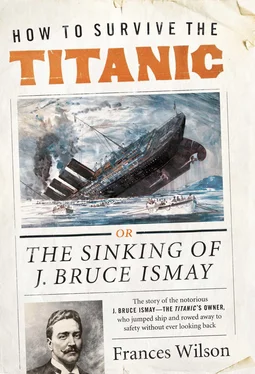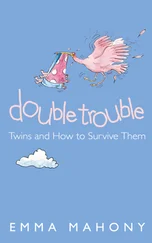‘We could see groups of almost fifteen hundred people still aboard,’ recalled Jack Thayer, ‘clinging in clusters or bunches, like swarming bees.’ The image recalls the journey made by Aeneas to the underworld in Dante’s Inferno, where he passes a valley in which he hears what he thinks are bees in a summer meadow. The humming, Aeneas is told, comes not from bees but from the souls of the dead drinking from the River Lethe, in order to forget their previous lives before returning to live for a second time on land. The cries also recall the passage in Rabelais’s Gargantua and Pantagruel, where the feasting passengers aboard a ship are terrified to hear the voices of people talking in the air. ‘Let us fly,’ they say, ‘Larboard! Starboard! Topsails! Scudding-sails! We’re all dead men. Let us fly, in the name of all devils, fly!’ Pantagruel’s ship was reaching ‘the approaches of a frozen sea over which there was a huge and cruel combat at the onset of last winter’; the words they heard were the cries of men and women which had frozen in the air. 13
Most of the survivors had not known until now that there were people still aboard the Titanic, that the ship was not equipped to save everyone. Edith Russell recalled that moments before the Titanic went down ‘there was a loud cry, as if emanating from one throat. The men in our boat asked the women to cheer, saying “those cheers that you hear in the big boat mean they have all gotten into lifeboats and are saved”. And do you know, that we actually cheered, believing that the big shout was one of thanksgiving.’ 14In a letter sent forty-five years later to Walter Lord, Lawrence Beesley described how they ‘had no knowledge of the number of boats available, how many had got away in the boats, and, in fact, no reason to doubt that every one on board had, in some way, a chance of safety. There was’, he said, ‘no forewarning of the tragedy, no anticipation of peril for our fellow passengers as we saw the Titanic glide slowly down to her doom. The ship had gone but the passengers were, in all probability, safe, waiting only as we did, for the dawn to bring the rescuing ships. Therefore the terrible nature of the cries, which reached us almost immediately after the Titanic sunk, came upon us entirely unprepared for their terrible message. They came as a thunderbolt, unexpected, inconceivable, incredible. No one in any of the boats standing off a few hundred yards away can have escaped the paralysing shock of knowing that so short a distance away a tragedy, unbelievable in its magnitude, was being enacted, which we, helpless, could in no way avert or diminish.’ 15
The lifeboats might have returned to rescue some of the many hundreds of people in the water, most of whom, floating in their lifejackets, would die of hypothermia, but both passengers and crew refused, fearing that suction from the sinking ship would pull them down, if they were not overwhelmed by soaking bodies trying to clamber to safety. To return would be suicide, they reasoned. In Lifeboat 1, referred to afterwards as the Money Boat, Lady Duff Gordon, also known as the fashion designer Lucille, watched the ship disappear and then commiserated with her maid: ‘You have lost your beautiful nightdress.’ Lord Duff Gordon was reported to have offered the seven crew members who were rowing them away £5 each for a new uniform if they did not turn back. Jack Thayer, struggling in the water, watched while the lifeboats ‘four or five hundred yards away, listen[ed] to the cries and still they did not come back. If they had turned back several hundred more would have been saved. No one can explain it. It was not satisfactorily explained in any investigation. It was just one of the many “Acts of God” running through the whole disaster.’
The only boat to attempt further rescue was Lifeboat 14, in the charge of Fifth Officer Lowe. Instead of taking his cargo into the swarm of struggling bodies, Lowe kept close to the wreckage and held himself ‘ready to save any poor man who might become detached from the big confused mass’. He rescued four people, including a Japanese passenger who had strapped himself to a door and seemed as lifeless as a marble statue. ‘What’s the use,’ Lowe had initially said. ‘He’s dead, likely, and if he isn’t there’s others better worth saving than a Jap.’ But once the rescued man recovered he jumped up, stretched, stamped his feet and took over an oar. ‘By Jove,’ exclaimed Lowe. ‘I’m ashamed of what I said about the little blighter. I’d save the likes o’ him six times over if I got the chance.’
Returning to save any of the gasping bodies was not discussed in Collapsible C. Instead, they looked for other boats. As Ismay’s was one of the three boats equipped with a lamp he could at least see, if he wished, the passengers who had paid for their tickets on the Titanic now floating in the water. But he did not look; nor did he turn his head. Ismay kept his eyes blank and fixed at some point in the distance.

By Tuesday 16 April, the whole world knew who J. Bruce Ismay was. The New York Times ran the headline: ‘Probably 1250 perish; Ismay safe’; the Denver Post was amongst dozens of papers to ask: ‘Who would not rather die a hero than live a coward?’ and the New York American summed up the case: ‘Mr Ismay cares for nobody but himself. He cares only for his own body, for his own stomach, for his own pride and profit. He passes through the most stupendous tragedy untouched and unmoved. He leaves his ship to sink with its powerless cargo of lives and does not care to lift his eyes. He crawls through unspeakable disgrace to his own safety.’ In England, Horatio Bottomley, spokesman for the working man and owner of the weekly, John Bull, addressed Ismay directly: ‘You were the one person on board who, as chairman of the White Star Line, had a large pecuniary interest in the voyage, and your place was at the Captain’s side till every man, woman and child was safely off the ship. The humblest emigrant in steerage had more moral right to a seat in the lifeboat than you.’ John Bull ran a three-month campaign against him, consisting of telegrams, articles, cartoons, letters and doggerel verses. ‘Someone’, wrote Bottomley, ‘ought to hang over this business. Sixteen hundred men and women have been murdered on high seas.’ In the Daily Mail, H. G. Wells, the literary giant of the age, was struck by the role played by chance in Ismay’s escape. ‘By the supreme artistry of Chance… it fell to the lot of that tragic and unhappy gentleman… to be aboard and to be caught by the urgent vacancy in the boat and the snare of the moment.’ Let ‘no untried man’, Wells continued, ‘say he would have behaved better in his place. But for capitalism and for our existing social system [Ismay’s] escape — with five and fifty third-class children waiting below to drown — was the abandonment of every noble pretension. It is not the man I would criticise, but the manifest absence of any such sense of the supreme dignity of his position as would have sustained him in that crisis. He was a rich man and a ruling man, but in the test he was not a proud man.’
The most serious accusation against Ismay was that he put profit before lives, dictating the ship’s speed to the Captain in order to get to New York in record time. ‘The Titanic disaster is a capitalist disaster,’ a radical Kansas paper declared, and ‘Ismay, worth one hundred million dollars and drawing a salary from the White Star Line of one hundred and seventy five thousand dollars’ is ‘the epitome of capitalism’. But the most common accusation was that Ismay had not behaved as a gentleman. ‘Gentlemen’, wrote Filson Young, ‘simply stood about the decks, smoking cigarettes, talking to one another, and waiting for the hour to strike. There is nothing so entirely dignified, as to be silent and quiet in the face of an approaching horror.’ Ismay’s actions were compared to those of other millionaires, men like Benjamin Guggenheim who had put on his dinner jacket and reputedly told his steward: ‘We’re dressed in our best and are prepared to go down like gentlemen. I am willing to remain and play the man’s game if there are not enough boats for more than the women and children.’ The night the Titanic went down, ‘all the great virtues of the soul were displayed’, wrote Philip Gibbs in a forty-page account, ‘The Deathless Story of the Titanic ‘, published two weeks after the wreck in a special edition of the mass circulation British paper, Lloyd’s Weekly News: ‘courage, self-forgetfulness, self-sacrifice, love, devotion to the highest ideals’. Logan Marshall, whose book, Sinking of the Titanic and Great Sea Disasters also appeared in 1912, suggested that the term ‘chivalry’ was ‘a mild appellation’ for the ‘conduct of the gentlemen’ on board. ‘Some of the vaunted knights of old were desperate cowards by comparison. A fight in the open field, or jousting in the tournament, did not call out manhood in a man as did the waiting till the great ship took the final plunge.’ In the Daily News, George Bernard Shaw railed against the romantic language of heroism, the ‘ghastly, blasphemous, inhuman, braggartly lying’ in which the catastrophe was couched. There was, for Shaw, ‘no heroism in being drowned when you cannot help it’.
Читать дальше













